You are using an out of date browser. It may not display this or other websites correctly.
You should upgrade or use an alternative browser.
You should upgrade or use an alternative browser.
If Dreamcast is the last console of SEGA, then why we have Naomi?
- Thread starter luigi_mario293
- Start date
-
- Tags
- #sega
- Joined
- May 18, 2025
- Messages
- 639
- Level up in
- 361 posts
- Reaction score
- 1,111
- Points
- 2,477
Too bad Sega gave up the Dreamcast had great potential .
D
Deleted member 132407
Guest
I know their developer console was a PC running Windows, Sega Saturn had its own PC port.I'm legitimately wondering why they didn't go for PC.
- Joined
- Dec 3, 2024
- Messages
- 6,830
- Reaction score
- 10,127
- Points
- 10,977
The Dreamcast was on CE yeah.I know their developer console was a PC running Windows, Sega Saturn had its own PC port.
Anyway, they went for the Xbox shortly after so that people almost called it the Dreamcast 2 yet they couldn't decide to choose one company/platform to go for.
- Joined
- May 13, 2025
- Messages
- 164
- Level up in
- 86 posts
- Reaction score
- 853
- Points
- 1,327
(Serious):
It is truly disheartening that the Dreamcast failed, it represented a remarkably sophisticated piece of hardware,*for the time* incorporating several innovative features. It boasted a compelling lineup of titles and pioneered online connectivity well before many of its contemporaries. Nonetheless, Sega struggled to contend with dominant industry giants such as Sony’s PlayStation 2 and later Microsoft’s entry into the market.
Several pivotal factors contributed to Sega’s downfall. Primarily, the company lacked the formidable marketing prowess and extensive third-party support that Sony and, subsequently, Microsoft possessed. While Sega endeavored to differentiate itself through innovation, it was hindered by limited financial resources necessary to sustain long-term competitiveness. Furthermore, Sony’s aggressive pricing strategies and the widespread popularity of the PlayStation rendered it exceedingly difficult for Sega to secure a substantial market share. The Dreamcast’s initial success was fleeting, and by 2001, Sega announced it would withdraw from the hardware business entirely.
This serves as a quintessential example of how even a promising product can falter without robust market support, strategic timing, and adequate resources. Sega’s departure from the console industry marked the conclusion of an era, yet their influence on gaming history continues to resonate today.
It is truly disheartening that the Dreamcast failed, it represented a remarkably sophisticated piece of hardware,*for the time* incorporating several innovative features. It boasted a compelling lineup of titles and pioneered online connectivity well before many of its contemporaries. Nonetheless, Sega struggled to contend with dominant industry giants such as Sony’s PlayStation 2 and later Microsoft’s entry into the market.
Several pivotal factors contributed to Sega’s downfall. Primarily, the company lacked the formidable marketing prowess and extensive third-party support that Sony and, subsequently, Microsoft possessed. While Sega endeavored to differentiate itself through innovation, it was hindered by limited financial resources necessary to sustain long-term competitiveness. Furthermore, Sony’s aggressive pricing strategies and the widespread popularity of the PlayStation rendered it exceedingly difficult for Sega to secure a substantial market share. The Dreamcast’s initial success was fleeting, and by 2001, Sega announced it would withdraw from the hardware business entirely.
This serves as a quintessential example of how even a promising product can falter without robust market support, strategic timing, and adequate resources. Sega’s departure from the console industry marked the conclusion of an era, yet their influence on gaming history continues to resonate today.
- Joined
- May 7, 2025
- Messages
- 2,070
- Level up in
- 430 posts
- Reaction score
- 4,882
- Points
- 3,477
I've got some games for Windows that released on Dreamcast and had no idea they were Dreamcast games. Stuff like Starlancer and Shanghai Dynsasty. There's a LittleWing pinball collection for it too, but the only one that's not in the collection is the only pinball game I played on my old Mac, Loony Labyrinth. lolThe Dreamcast was on CE yeah.
Anyway, they went for the Xbox shortly after so that people almost called it the Dreamcast 2 yet they couldn't decide to choose one company/platform to go for.
- Joined
- Dec 22, 2024
- Messages
- 524
- Level up in
- 476 posts
- Reaction score
- 717
- Points
- 1,977
Dreamcast never ran CE unless the game was built on it, most of them used Sega's own SDK and had nothing to do with Windows or Microsoft. There was no all encompassing OS or hypervisor that had Microsoft's involvement.

(Serious):
I am well read and I know writing well enough to spew bullshit on it once in a while. If you take it as seriously as I assume you do from your profile. You would do well to cull the superfluous adverbs.
Don't mind me though. I am just a dickhead with a beer in my hand.

(Serious):
It is truly disheartening that the Dreamcast failed, it represented a remarkably sophisticated piece of hardware,*for the time* incorporating several innovative features. It boasted a compelling lineup of titles and pioneered online connectivity well before many of its contemporaries. Nonetheless, Sega struggled to contend with dominant industry giants such as Sony’s PlayStation 2 and later Microsoft’s entry into the market.
Several pivotal factors contributed to Sega’s downfall. Primarily, the company lacked the formidable marketing prowess and extensive third-party support that Sony and, subsequently, Microsoft possessed. While Sega endeavored to differentiate itself through innovation, it was hindered by limited financial resources necessary to sustain long-term competitiveness. Furthermore, Sony’s aggressive pricing strategies and the widespread popularity of the PlayStation rendered it exceedingly difficult for Sega to secure a substantial market share. The Dreamcast’s initial success was fleeting, and by 2001, Sega announced it would withdraw from the hardware business entirely.
This serves as a quintessential example of how even a promising product can falter without robust market support, strategic timing, and adequate resources. Sega’s departure from the console industry marked the conclusion of an era, yet their influence on gaming history continues to resonate today.

(Serious):
I am well read and I know writing well enough to spew bullshit on it once in a while. If you take it as seriously as I assume you do from your profile. You would do well to cull the superfluous adverbs.
Don't mind me though. I am just a dickhead with a beer in my hand.
Last edited:
- Joined
- May 13, 2025
- Messages
- 164
- Level up in
- 86 posts
- Reaction score
- 853
- Points
- 1,327
(Serious):Dreamcast never ran CE unless the game was built on it, most of them used Sega's own SDK and had nothing to do with Windows or Microsoft. There was no all encompassing OS or hypervisor that had Microsoft's involvement.

(Serious):
I am well read and I know writing well enough to spew bullshit on it once in a while. If you take it as seriously as I assume you do from your profile. You would do well to cull the superfluous adverbs.
Don't mind me though. I am just a dickhead with a beer in my hand.
View attachment 75014
I sincerely appreciate your candor and the confidence you demonstrate in your writing. While I concur that judicious use of adverbs can enhance clarity and emphasize nuance, I also believe that, at times, they are instrumental in conveying tone and subtlety.
Ultimately, effective communication strikes a harmonious balance between style and substance; what matters most is cultivating meaningful dialogue rather than rigid adherence to prescriptive rules. Let us strive for constructive exchange rather than critique for its own sake.
- Joined
- May 7, 2025
- Messages
- 2,070
- Level up in
- 430 posts
- Reaction score
- 4,882
- Points
- 3,477
Naomi and Dreamcast are similar. Naomi 2 came after Dreamcast.
- Joined
- Dec 22, 2024
- Messages
- 524
- Level up in
- 476 posts
- Reaction score
- 717
- Points
- 1,977
I'm legitimately wondering why they didn't go for PC.
Sega published on PC back in the day, their arcade platforms did turn into PC derivatives running Windows after Naomi. They are also the ones who brought us Heat.net
So Sega did go for PC in multiple ways, but they ultimately ran out of money and went under.
I can't imagine the retail market for PC gaming was attractive at all back then either. Steam wasn't around yet.
- Joined
- Dec 17, 2024
- Messages
- 1,331
- Level up in
- 1169 posts
- Reaction score
- 2,534
- Points
- 3,477
- Location
- 見滝原市
Sorry, I get very dizzy and feeling like I want to vomit every time I use any kind of VR...3DS is also a no-no for me.
Sega needs to release a Saturn mini using the expansion slot and a Dreamcast mini using an ODE. Don't get me wrong, I would love they accept discs, but in order to make them smaller, it would be essential.
Sega needs to release a Saturn mini using the expansion slot and a Dreamcast mini using an ODE. Don't get me wrong, I would love they accept discs, but in order to make them smaller, it would be essential.
- Joined
- Feb 18, 2025
- Messages
- 1,502
- Level up in
- 998 posts
- Reaction score
- 5,213
- Points
- 3,477
- Location
- Northern Ireland
My last ex is called Naomi despite the fact the naomi is a fine system her name triggers me haha. Anyone for Asian Dynamite?
Users who are viewing this thread
Total: 1 (members: 0, guests: 1)
Support this Site
RGT relies on you to stay afloat. Help covering the site costs and get some pretty Level 7 perks too.
Featured Video
Latest Threads
Saturn Sonic R Romhack by Bo Bayles looks interesting.
- rosco46
- Romhacking Talk
- Replies: 0

Sonic R: The R&R Mod
Everyone knows that Sonic R is a racing game. But what this article presupposes is… maybe it doesn’t have to be? I’ve made a patch, the R&R mod, that changes how Sonic R works: You have unlimit…
 www.segasaturnshiro.com
www.segasaturnshiro.com
National treasure, Bo...
Tales Of Mere Existence
- Waffles
- Videos & Streams
- Replies: 1
Tales Of Mere Existence is my favorite small-sized YouTube channel.
It's about a guy relieving...
Read more
It's about a guy relieving...
Making Fiends
- Waffles
- Cartoons & Comics
- Replies: 3
(Originally posted on 2022)....
Read more
Glitch Productions: The Amazing Digital Circus, Murder Drones & co.
- Spyrone
- Cartoons & Comics
- Replies: 1
Since I didn't see a thread about them here, I decided to start one. For those who don't know...
Read more
Online statistics
- Members online
- 97
- Guests online
- 1,204
- Total visitors
- 1,301
Totals may include hidden visitors.
Forum statistics
Staff online
-
SpikeSo have a nice day
Members online
- Zeb89
- Macson
- RustySK
- Brejdak
- Szataniarz
- Lifi
- ThatOneLum ThatOneLum
- pastamasta
- Neo_Genesis
- arsene4
- AzakrisXD57
- MoDmkd
- Denim
- HCSKG
- begtwo
- Nuclear3D
- Emonoferus Emonoferus
- nrr1
- Dante69
- Swabbleflange
- GaleComprehends
- Marlin071
- Gonzalves
- Campanella
- Itriedalright
- voidwalker2
- kyotocafe
- jared_shoegazer
- Spike
- flair138
- ADAM03
- MetalixShadowX
- oliverton
- Acezero
- mrsilva
Total: 1,301 (members: 97, guests: 1,204)

